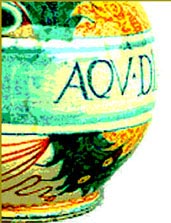| |
|
|
| |
|
|
| |
| Crèdits / Crédits / Credits |
|
|
|
|
|
METODOLOGIA DOCENT |
|
|
|
|
|
|
|
|
SIMULACIÓN DE DISPENSACIÓN ACTIVA DE MEDICAMENTOS COMO RECURSO FORMATIVO EN LA DOCENCIA DE FARMACOLOGÍA Y FARMACIA CLINICA
|

|
|
|
|
Ferrándiz, ML.; Ubeda, A.; Recio, MC.; Noguera, MA.; Amigó, M. ;D’Ocón, P.; Ivorra, MD. |
|
|
|
|
RESEÑA |
|
|
El objetivo de este trabajo es describir la actividad práctica de “simulación de dispensación
activa” y analizar la formación y adquisición de habilidades por parte del estudiante de
Farmacia de cara al desarrollo de su actividad profesional dentro de la Atención Farmacéutica.
Esta actividad se desarrolla en dos sesiones prácticas. En la 1ª sesión, se realiza el diseño de un
protocolo para una correcta dispensación activa y se asigna una especialidad farmacéutica. El
estudiante debe hacer el análisis y la búsqueda de la información necesaria. En la 2ª sesión se
hace el desarrollo de la simulación contemplando pacientes con diferentes casuísticas. El
estudiante debe abordar los aspectos básicos que el paciente debe conocer y dar la información
necesaria en un lenguaje adecuado, así como consejos de uso y aplicación. También debe ser
capaz de resolver las dudas planteadas por el paciente y detectar posibles problemas
relacionados con la medicación. En esta simulación el profesor valora tanto los conocimientos
adquiridos sobre la especialidad farmacéutica a dispensar, como las habilidades de
comunicación con el paciente. Los estudiantes valoran muy positivamente esta actividad
práctica. Los profesores la consideramos muy formativa ya que el estudiante se conciencia y
desarrolla las habilidades y capacidades necesarias para la correcta dispensación. |
|
|
|
|
|
REVIEW |
|
|
The objective of this paper is to describe a practical activity based in “dispensation simulation in
a community pharmacy”, and to analyse the degree of proficiency and abilities acquired by the
4th year students of Pharmacy, addressed to the development of their future professional activity
in Pharmaceutical Care. The activity is divided in two sessions, in the first one the students are
asked to design a guided protocol for the rational dispensation, and then a medicine is assigned
to each group of student. They must collect the information to allow them to meet patients’
drug-related needs in several clinic situations. The second session is based in the performance of
the dispensing process with different pharmaceutical forms to different patients. The student
must assess/detect the type of basic information for the patients (advices of use and application)
and how to give them this information with an accessible language using the medicine ascribed
to them in the first session as a model. This activity allows the teacher to evaluate the students’
ability to apply the knowledge about use of medication and also to communicate with the
patient. Most of the students rate this activity as good or excellent. We thus consider that this
simulation–based learning allows the student to realize how to develop a future correct
dispensation process. |
|
| |
 |
| |
tornar al sumari |
|
|



